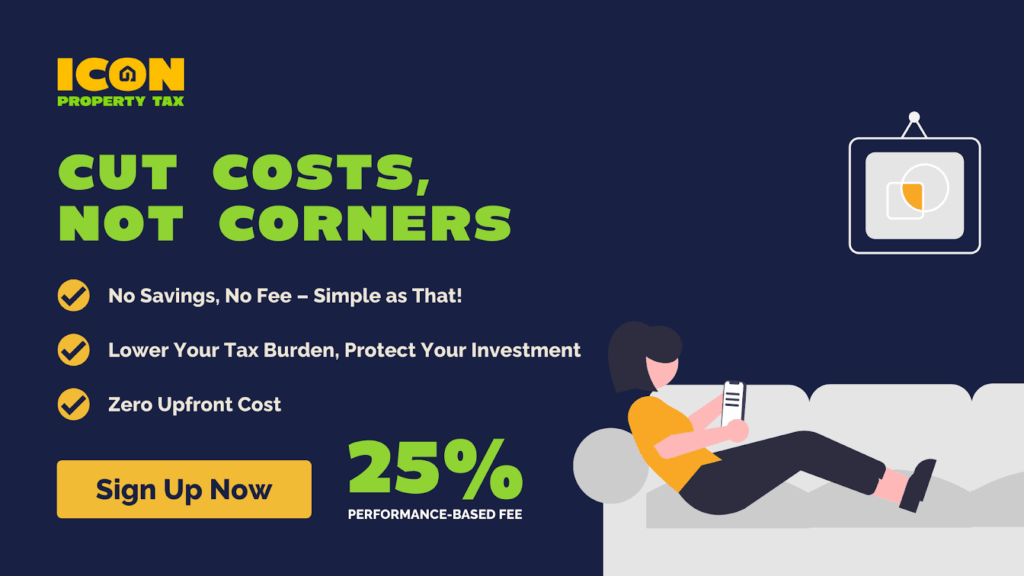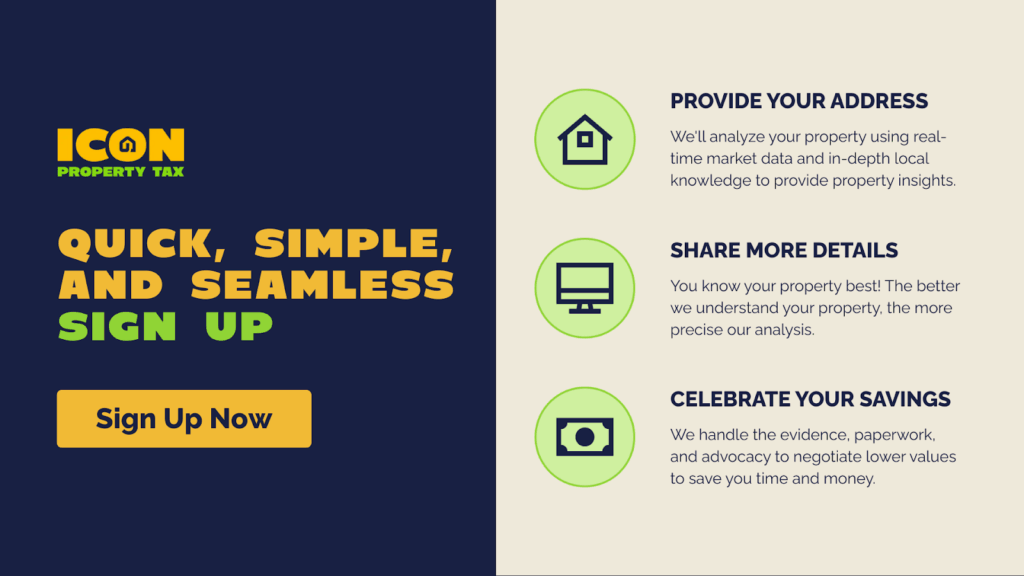Essential Texas Home Buying Guide: Taxes, Costs & Legal Insights
August 9, 2025
Key Takeaways:
- Hidden Costs: Buyers should budget beyond the purchase price, including escrow, inspections, and prepaid expenses.
- Tax Risk: Texas property taxes are high and vary by county; understanding your tax rights is crucial.
- Legal Layer: Navigating contracts, title checks, and exemptions in Texas requires more than just a good agent.
Buying a home in Texas can be one of the most rewarding and complex financial decisions you’ll make. The Lone Star State offers no shortage of opportunity, but with that comes high property taxes, confusing legal steps, and upfront costs that many first-time and experienced buyers underestimate. Knowing how these factors work together isn’t just helpful, it’s essential to making a smart, long-term investment.
At ICON, we’ve saved Texas homeowners over $100 million in property tax reductions, and we do it with a zero-upfront-cost, no-savings-no-fee approach that puts the homeowner first. As one of Texas’ leading property tax advocacy firms, we know the ins and outs of Texas real estate law, local tax systems, and the actual cost of homeownership. Our mission is simple: help you keep more of what’s yours.
In this piece, we’ll break down the real costs of buying a home in Texas, from taxes and fees to legal details, and show you how to protect your purchase and lower your tax burden confidently.
Understanding The Texas Housing Market
Buying a home in Texas means entering one of the country’s most diverse and fast-growing real estate markets. From bustling metro areas like Austin, Houston, and Dallas to quieter suburban and rural regions, the Texas housing landscape offers something for almost every type of buyer.
Texas continues to attract new residents thanks to its relatively affordable cost of living, strong job market, and absence of a state income tax. This influx has kept demand high in many areas, making it critical for buyers to understand both the current market trends and the long-term implications of their purchase.
Unlike some other states, Texas real estate laws and tax structures can significantly impact your long-term costs, especially property taxes. That’s why doing your homework before making an offer isn’t just smart; it’s essential.
As you navigate the process, staying informed on local trends and future property values is key to making a confident and well-planned investment.

Initial Costs When Buying A Home In Texas
Buying a home in Texas involves more than just the listing price. Several upfront costs can catch buyers off guard if they’re not prepared. Here’s a breakdown of the most common initial expenses:
Down Payment
Most homebuyers in Texas can expect to put down anywhere from 3% to 20% of the home’s purchase price, depending on the type of loan and their financial profile. While some assistance programs exist, they often have eligibility requirements that should be reviewed carefully.
Closing Costs
Closing costs in Texas typically run between 2% and 5% of the home’s price. These fees can include title insurance, attorney services, lender charges, and other administrative expenses for finalizing the sale.
Prepaid Expenses
Lenders often require buyers to prepay certain expenses such as homeowners insurance, property taxes, and initial mortgage interest. These are usually deposited into an escrow account to cover future payments.
Home Inspection & Appraisal
A professional home inspection, usually costing between $300 and $500, is highly recommended to uncover potential issues. Similarly, most lenders require appraisals to confirm the property’s value before approving your mortgage.
Looking to keep more cash in your pocket? Protect your investment and only pay when you save with ICON’s zero-upfront-cost approach to property tax reduction.
Property Taxes In Texas: What To Expect
Texas does not have a state income tax, which makes property taxes a primary revenue source for local governments. As a result, Texas property tax rates are among the highest in the country, and understanding how they’re calculated is key to planning your homeownership budget.
Property taxes are based on the assessed value of your home, multiplied by the local tax rate set by counties, cities, school districts, and other authorities. Rates can vary significantly depending on where you live, even between neighboring communities.
Your property’s appraised value is determined annually by the county appraisal district. If the value increases sharply, your tax bill likely will too, unless you successfully protest the valuation or qualify for exemptions.
Lower your tax burden, protect your investment. At ICON, we specialize in protesting over-assessed property values to help Texas homeowners reduce their annual tax bills. Sign up now with zero upfront cost.
Legal Considerations For Texas Homebuyers
Buying a home in Texas involves more than just finding the right property, it also means understanding the legal responsibilities that come with the purchase. From title insurance to contract terms, knowing your rights can prevent costly surprises down the road.
One of the most important legal steps is reviewing the sales contract, which outlines the terms, conditions, and obligations of both buyer and seller. Texas contracts can include contingencies related to financing, inspections, and deadlines that should not be overlooked.
You’ll also need to ensure the property has a clear title, free of liens or legal claims. Title insurance protects you in case of disputes over ownership or missed records, and it’s a one-time cost paid at closing.
Protect your property, and your peace of mind. ICON helps Texas homeowners stay on solid ground by making sure you’re not overpaying for what’s legally yours. See how we can help.

How To Lower Your Property Tax Burden
Texas homeowners often assume their property tax bill is set in stone, but that’s not the case. If the county appraisal district has overvalued your property, you have the legal right to protest the valuation and potentially reduce your tax liability.
Texas property owners can file a protest during the appraisal review period each year. This process involves submitting evidence, such as comparable home sales or documentation of property defects, supporting a lower assessed value.
Hiring a professional to handle your property tax protest can save you time and improve your chances of success. At ICON, we hold the entire process on your behalf, and you only pay if we save you money: no-savings, no-fee pledge. With ICON, you don’t pay unless we reduce your tax burden. It’s that simple.
Common Mistakes To Avoid When Buying A Home In Texas
Even seasoned buyers can overlook key details when purchasing property in Texas. The excitement of finding the right home often overshadows the fine print, leading to costly oversights that could have been avoided with the proper guidance. At ICON, we’ve seen where things go wrong and helped thousands of homeowners recover from expensive missteps.
Ignoring Property Tax History
Many buyers look at the current tax bill and assume it will remain the same. In reality, taxes can rise sharply based on the county’s new valuation after your purchase, especially if the previous owner had exemptions you don’t yet qualify for.
Skipping The Protest Process
Failing to challenge your initial appraisal could lock you into a higher property tax for years. Protesting early and accurately is your first line of defense against overpaying.
Overestimating Exemptions
Texas offers significant property tax exemptions, but they’re not automatic. New homeowners must file for benefits like the homestead exemption; failure to do so can leave thousands on the table.
Underestimating Closing Costs
It’s easy to focus on the down payment, but closing costs, including title insurance, prepaid taxes, and escrow fees, can add up fast. Not budgeting for these upfront can create a stressful closing experience.
Going It Alone
Buying a home without trusted professionals, especially when it comes to property tax expertise, can leave you unprotected. ICON exists to help you identify, challenge, and reduce inflated property values before they become permanent.
Stand your ground. Don’t let common mistakes drain your investment. Join thousands of homeowners who trust ICON to challenge unfair valuations; you don’t pay unless you save.
Working With Professionals You Can Trust
Buying a home in Texas is a significant investment, and having the right team behind you can make all the difference. Real estate agents, mortgage lenders, inspectors, attorneys, and tax specialists each play a role in protecting your interests throughout the process.
Not all professionals are created equal, especially when evaluating property taxes and long-term homeownership costs. Choosing trusted experts, like ICON, ensures you’re not wasting money or making decisions based on incomplete information.
At ICON, we focus on helping homeowners lower their property tax burden and protect their investment for years to come. Let us take the stress off your plate, with zero upfront cost.

Final Thoughts
Buying a home in Texas is an exciting step, but it comes with significant financial and legal responsibilities. From understanding upfront costs to navigating one of the country’s most complex property tax systems, preparation is key to making an innovative and sustainable investment.
With the proper knowledge and trusted professionals, you can avoid common pitfalls and protect your long-term financial future. ICON is here to help homeowners across Texas reduce tax burdens and stay informed every step of the way.
Protect your investment with no upfront cost. Join thousands of Texas homeowners who only pay when they save. ICON has your back.
Read Also:
- DuPage County Property Tax Overview: Rates, Assessments, and Billing Cycles
- Kane County Property Tax Overview: Rates, Assessments, And Billing Cycles
- Will County Property Tax Overview: Rates, Assessments, And Billing Cycles
Frequently Asked Questions About Buying a Home in Texas
Is earnest money required when buying a home in Texas?
Yes, most Texas home purchases involve earnest money, a deposit (usually 1% to 2% of the purchase price) that shows you’re serious about buying. It’s typically credited back to you at closing.
Can I buy a home in Texas as a non-resident or foreign national?
Yes, non-residents and foreign nationals can legally purchase real estate in Texas. However, financing and tax implications may differ, so it is advised to consult legal and tax professionals.
How long does the home-buying process typically take in Texas?
The average timeline from offer to closing in Texas is 30–45 days, depending on financing, inspections, and negotiations.
What is a homestead exemption in Texas, and how does it help?
A homestead exemption can reduce the taxable value of your primary residence, lowering your annual property tax bill. You must apply for it through your local appraisal district.
Are there any Texas-specific homebuyer assistance programs?
Yes. Programs like My First Texas Home offer down payment and closing cost assistance to eligible first-time buyers. Requirements vary based on income and location.
What is an option period in a Texas home contract?
The option period is a negotiated timeframe (usually 5–10 days) that allows buyers to inspect the property and back out for any reason without penalty.
Are property taxes paid monthly or annually in Texas?
Texas property taxes are billed annually, but most homeowners pay them monthly through an escrow account managed by their lender.
Does Texas require a real estate attorney for home purchases?
No, Texas doesn’t require buyers to use a real estate attorney, but it’s often recommended, especially for complex transactions or buying without an agent.
Can I back out of a home purchase after my offer is accepted?
Yes, but only under certain conditions outlined in your contract, such as financing or inspection contingencies. Otherwise, you may lose your earnest money.
What is a survey in a Texas home transaction, and do I need one?
A survey outlines the legal boundaries of the property and is often required by lenders. It can help identify encroachments, easements, or boundary disputes.

